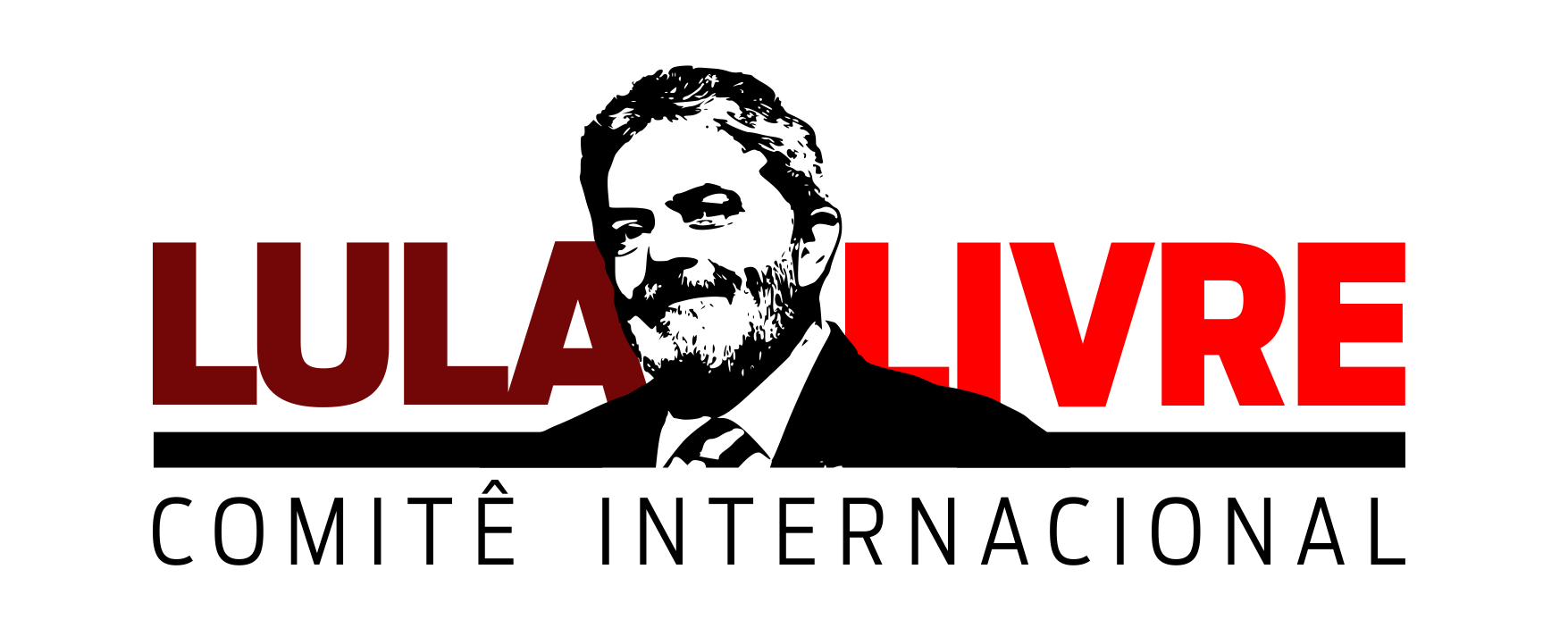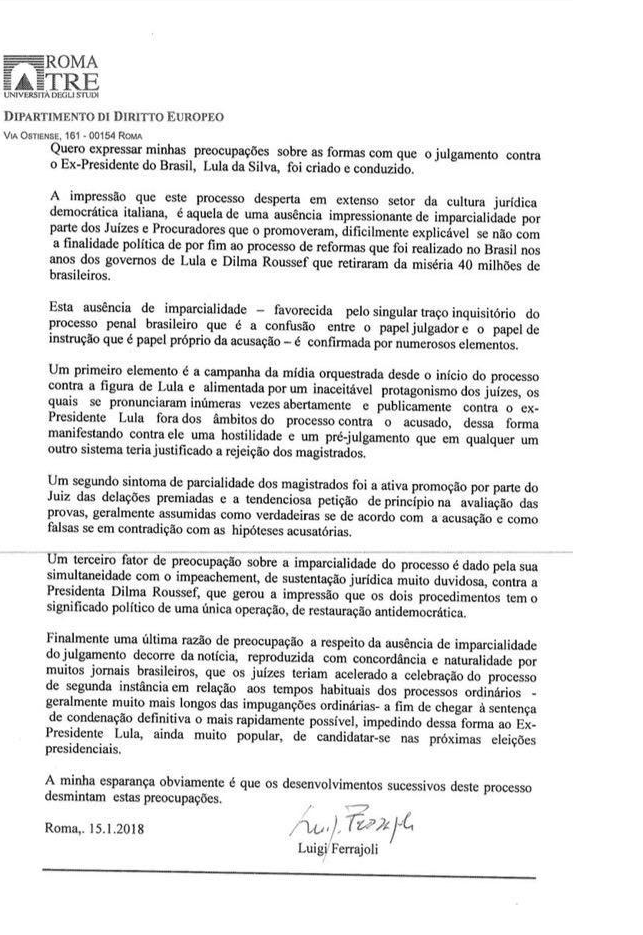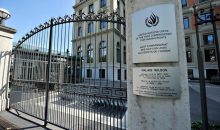[Statement] The process against president Lula: A political persecution

There is a historical perception in developed countries that corruption is widespread in developing countries and that most of the politicians and rulers of this country personally benefit from it. It is from this perspective that the international media almost always analyze the current Brazilian situation and the lawsuits against Lula. However, there is no wrongdoing on his part and his arrest is the result of political persecution aimed at preventing him from running again for the President of the Republic in the October elections.
The lawsuit against former President Luiz Inacio Lula da Silva was tried at first instance by federal judge Sérgio Moro, head of the 13th Federal Court of Curitiba, and capital Paraná state, in southern Brazil that sentenced him to nine years and six months of imprisonment. The conviction was upheld by the court of second instance, the Federal Regional Court of the 4th Region, based in Porto Alegre, which increased its sentence to 12 years and 1 month.
The Federal Constitution, in its Article 5, item LVII, ensures that “no one shall be held guilty until a final sentence of conviction is passed.” This means that the presumption of innocence will last until the end of the process, which may include the appraisal of appeals until the last instance, the Federal Supreme Court. Therefore, a conviction in lower courts cannot have immediate effects, under penalty of violation of this constitutional guarantee.
The former president is accused of passive corruption and money laundering because he would have received from the President of OAS Constructor a triplex apartment on a very popular beach on the coast of the state of São Paulo. This property was considered by the Prosecution as an undue advantage due to deviations in contracting with Petrobras. Reforms made in the property were considered acts of money laundering. However, Lula and his family never owned or spent a night in that property and even did not even have their keys.
The initial investigation of “Operation Lava Jato” determined money-laundering acts carried out by a group of “doleiros” for the benefit of the late Federal Deputy José Janene, elected by the state of Paraná. According to the Constitution, the facts related to persons who hold elective positions in the National Congress must be determined before the Federal Supreme Court. However, the case was before Federal Judge Sérgio Moro, at first instance, on the grounds that one of these alleged acts of washing would have been consummated in Londrina, a municipality in the state of Paraná.
Moro was not competent to try the case of Lula, since the alleged triplex apartment is located in another state and another region of the country. The building where this apartment is located began to be built by the Banking Housing Cooperative (Bancoop) founded by the Banking Union of São Paulo, but as a result of its financial crisis several projects were sold to other companies, which included this building on the coast from Sao Paulo. Dona Marisa, Lula’s wife, had a share with Bancoop for a long time. OAS Empreendimentos acquired the rights of construction and commercialization of this building and offered the triplex apartment as a way to compensate this credit, which was never accepted by Lula and his relatives.
The apartment never ceased to be owned by OAS, who even presented this property as collateral in a bank loan agreement. The apartment also appeared as being of the company in the process of judicial reorganization of OAS, which also demonstrated who was its real owner. In addition, there is no document that proves Lula’s interest in acquiring the property or proving its possession or use.
One of the partners of OAS Contractors, known as Léo Pinheiro, said that he made the property available as a return for a contract with Petrobras. But he only said that after being sentenced to 16 years in prison and seeing his prized collaboration agreement rejected by Judge Sérgio Moro. He cannot corroborate this accusation. So far, there has been no news of the approval of an awarded collaboration agreement by Léo Pinheiro, but Judge Sérgio Moro accepted his statement as if it were true, although allegations without evidence are not accepted by Brazilian law and benefited him with a softening of sentence not provided for by law, which is completely uncommon in Brazilian legal tradition.
According to Brazilian jurisprudence, the Public Prosecutor’s Office should have indicated how Lula would have favored OAS Contractors in contracts with Petrobras, a question technically called an “official act”. The prosecutors of the Republic, with the agreement of Moro, only said that Lula favored the contractor by influencing Petrobras’ Board of Directors in the choice of directors. Indications of persons to hold positions in organs and companies linked to the Federal Government are daily issues of the function of President of the Republic of Brazil, which makes his condemnation absurd, since there is no “official act” and no proof that Lula received any benefit from OAS or laundered money.
There were other illegalities such as coercive driving without prior summons suffered by Lula in 2016 and the clandestine recording of the phones of the law firm that represents him. The judge’s partiality was also evidenced by his participation in events organized by politicians and media outlets antagonistic to Lula.
The former president is still awaiting the decision of two other courts: the Supreme Court of Appeals (3rd instance) and the Supreme Court (STF). In 2016, the STF decided by a narrow majority (6 votes to 5) that it is possible to arrest someone after a conviction in the second instance, contrary to what is stated in the Constitution, which states that no one will be found guilty until the res judicata of the process, the which only occurs after the Defense has no longer the possibility of reversing the decision.
Even before his arrest, Lula’s defense filed a habeas corpus pointing to the risk of violating this constitutional guarantee, but the Brazilian Supreme Court, again 6 to 5, denied the request. One of the judges who opposed the habeas corpus stated that the arrest in second instance violates the Constitution, but that the jurisprudence of 2016 could not be reformed merely in the judgment of an individual’s habeas corpus and the President of the Supreme Court has prevented the subject be discussed again.
The political persecution of Lula also reveals itself through other facts such as the first and second instance cases at a record and unprecedented speed in comparison with other defendants so that the condemnation would be adequate to the political timing of 2018, in this case, the presidential election and the increased sentence prevents the “crime” of which Lula is accused, being prescribed.
The political persecution of Lula was evidenced again after a Judge on duty at TRF-4 granted a Habeas Corpus to release him, because he understood that the jurisprudence of the STF allows for imprisonment in the lower court, but that it is not mandatory and would depend on a specific justification, which did not occur in the case of Lula. The Judge acted within his competence, but despite this, Moro, while on vacation abroad and not being responsible for the case, interfered with the Federal Police, where Lula is detained, and with another TRF-4 Judge, likewise enjoying so that the former President was not released.
Even incarcerated, Lula leads all polls. Although in Brazil there is a controversial electoral law called “Ficha Limpa” (Clean Records), which in principle prevents the election of people convicted in second instance, majority jurisprudence has allowed this ineligibility to be suspended until the conviction has been passed, since the Constitution ensures that the political rights to vote and to be voted can only be suspended by a conviction where there are no more resources. In this way, the PT will register the candidacy of Lula and will try to make it legally feasible.
Lula is a political prisoner. He is innocent of the charges against him. It was the ruler of Brazil who most promoted laws and measures to combat corruption. His personal wealth when he left the presidency in 2010 was the same as when he took office in 2003. He does not have bank accounts in foreign countries or in tax havens. You must be released and exercise the right to be a candidate again.
THE OPINIONS OF SOME JURISTS
Geoffrey Robertson (Australia), lawyer, author of books on human rights and Lula’s lawyer at the United Nations Commission on Human Rights (UNHRC) when interviewed by GGN on 02/02/2018 during the follow-up of the TRF-4 trial:
“I came here hoping that in a court of second instance there would be ample defense, rather than the primitive situation of the trial in which a judge is partial.
I need to say that I was a bit concerned about the behavior of Judge Thompson Flores. Who is Thompson Flores? He is the President of the Court of Appeal. When you pick up the courthouse elevator in Porto Alegre, which is what I did today, at the top is Thompson Flores. His office controls the whole court, meaning he is the president.
And this man, a few days after Judge Moro gave his trial, told into a news conference that such a decision was “perfect”, “without any defect.” How do you Brazilian citizens expect a fair trial, a decision about the appeal, when the President of the Court who will decide the question says that the judgment he is appealing is ‘perfect’ before he even had time to read it, because the document is very extensive?
It’s unbelievable. Something like this would never happen in any civilized country in the world. To have the president of a court of second instance say, even before the appeal is filed, that the decision is perfect. And then, a few days ago, his chief of staff says on his own Facebook page that Lula should go to jail. And what does he do? Of course she should be reprimanded in some way. But no, he had not do anything. He defends her right to freedom of expression. “
Luigi Ferrajoli (Italy), lawyer, professor of law and author of books widely used in law courses in Brazil in open letter 15/01/2018:
I want to express my concerns about the ways that the trial against former President Lula was created and conducted.
The impression that this process arouses in an extensive sector of the Italian democratic legal culture, is that of an impressive absence of impartiality by the Judges and Prosecutors led, hardly explainable if not with the political purpose of ending the process of reforms that was made in Brazil during the years of Lula and Dilma Rousseff governments, on which more than 40 million Brazilians were driven away from poverty.
This lack of impartiality – favored by the singular inquisitorial stroke of the Brazilian criminal process, which is the confusion between the judging and the instruction role – that is the proper role of the accusation – is confirmed by numerous elements.
A first element is the media campaign orchestrated against the figure of Lula and fueled by an unacceptable participation of judges, who have spoken openly and widely against the former president, outside the areas of the trial against the defendant. Thus presenting against him hostility and a pre-trial that in any other system would have justified the exclusion of these magistrates.
A second symptom of the judge bias, was his active promotion of prized confessions and a tendentious request of principle in the evaluation of the evidence, generally assumed to be true if they agreed with the vision of the accusation and as false if in contradiction with the accusatory hypotheses.
A third factor of concern about the impartiality of the process is given by the simultaneity of the impeachment, with a very doubtful legal basis, against President Dilma Rousseff, who generated the impression that the two procedures have political meaning of a single operation, of undemocratic restoration.
Finally, a final reason for concern regarding the lack of impartiality of judgment results from the news, reproduced with concordance and naturalness by many Brazilian newspapers, that the judges would have accelerated the process in the appellate court in relation to the times habitual in ordinary processes – usually much longer than ordinary challenges – with the aim of reaching the final condemnatory sentence as quickly as possible, thus preventing former President Lula, still quite popular, from running in the next elections Presidential
My hope is obviously that the successive developments of this process disprove these concerns.


